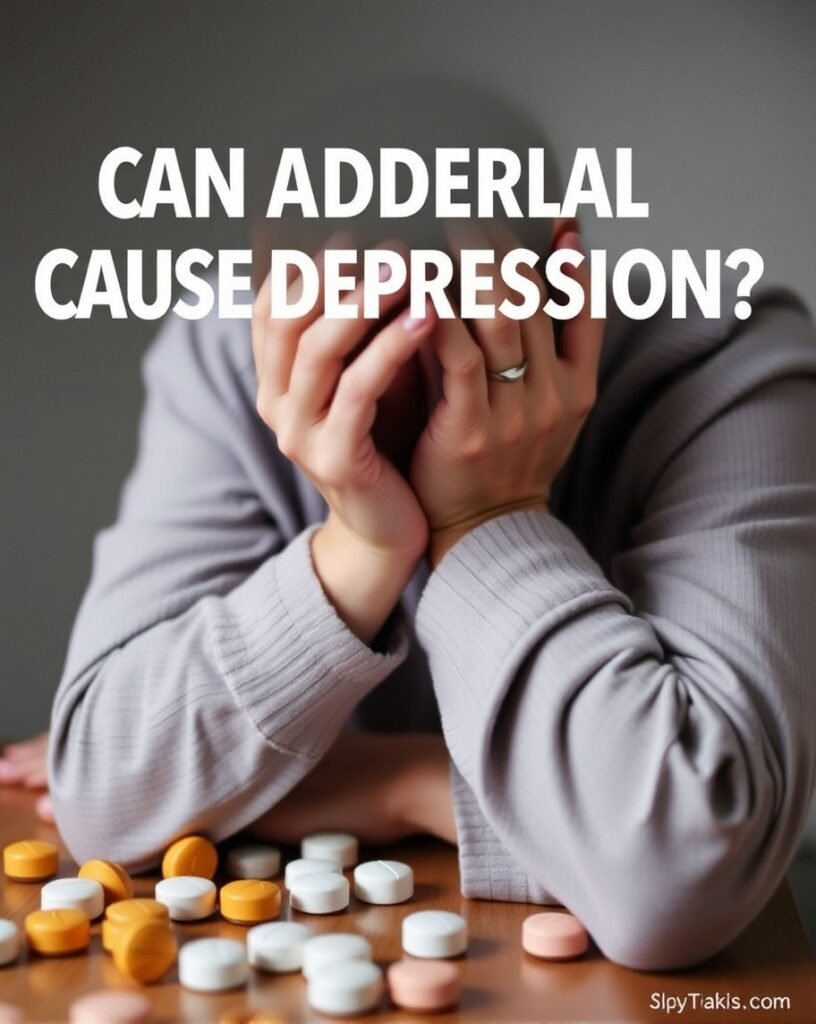Table of Contents
Can Adderall Beget Depression in Grown-ups? Discover 5 Ways It May Impact Mental Health

Introduction
can adderall cause depression in adults depression in adults :In recent times, the use of tradition instigations, particularly Adderall, has come decreasingly common among grown-ups, especially for managing Attention deficiency Hyperactivity complaint( ADHD). While Adderall has been shown to effectively ameliorate focus, attention, and overall quality of life for numerous individualities, there’s a growing discussion girding its implicit side goods, specifically regarding mood and internal health. This leads us to the vital question Can Adderall beget depression in grown-ups?
This blog aims to give a comprehensive understanding of Adderall, its goods on internal health, and how it can impact grown-ups else. We’ll explore five crucial ways Adderall may impact emotional well- being and give practical perceptivity for managing any adverse goods.
Understanding ADHD in Grown-ups
ADHD is frequently perceived as a nonage condition, but it affects millions of grown-ups. Symptoms may include difficulty concentrating, impulsivity, and emotional insecurity. In grown-ups, these symptoms can manifest as challenges in maintaining connections, managing time effectively, and performing in the plant.
1.Statistics on ADHD: According to the National Institute of Mental Health, around 4.4 of grown-ups in the U.S. have ADHD. A significant number of grown-ups with ADHD remain undiagnosed or misdiagnosed, leading to a range of complications in their particular and professional lives.
preface to Adderall
Adderall is a combination of amphetamine and dextroamphetamine, both of which are central nervous system instigations. It’s primarily specified to treat ADHD and wakefulness by enhancing neurotransmitter exertion, particularly dopamine and norepinephrine, in the brain. These neurotransmitters play a pivotal part in attention, focus, and mood regulation.
While numerous individualities find relief from ADHD symptoms with Adderall, the drug can also beget significant side goods, including anxiety, mood swings, and indeed depression in some cases. Understanding these implicit pitfalls is essential for anyone considering or presently using Adderall.
1.What’s Adderall? How It Works in the Brain
Components of Adderall
Adderall contains two active constituents amphetamine and dextroamphetamine. These instigations increase the situations of certain neurotransmitters in the brain, particularly dopamine and norepinephrine.
Dopamine: is frequently called the “ feel- good ” neurotransmitter, as it’s involved in pleasure, price, and provocation.
Norepinephrine: affects attention and responding conduct in the brain. It can help ameliorate focus and alertness.
Medium of Action
Adderall workshop by promoting the release of dopamine and norepinephrine from presynaptic neurons and inhibiting their reuptake. This leads to increased attention of these neurotransmitters in the synaptic split, enhancing communication between neurons, which improves attention and focus.

Short- term vs. Long- term goods
Short- term goods: druggies frequently witness heightened focus, increased energy, and bettered mood shortly after taking Adderall.
Long- term goods: Dragged use can lead to forbearance, taking advanced boluses to achieve the same effect, which may affect in mood disturbances or indeed dependence.
Differences Between goad and Non-Stimulant ADHD specifics
While Adderall is a goad, there arenon-stimulant options available for treating ADHD, similar as atomoxetine( Strattera). Understanding these differences is pivotal for individualities who may be sensitive to instigations or experience side goods like depression.
instigations: Generally more effective for ADHD symptoms but come with a advanced threat of side goods and implicit for abuse.
Non-stimulants May be preferable for individualities with a history of substance abuse or those who witness significant side goods from instigations.
Implicit pitfalls of Using Adderall
Despite its effectiveness, Adderall is n’t without pitfalls. Some druggies report passing anxiety, perversity, and mood swings, which can lead to passions of depression. Understanding these pitfalls is vital for informed decision- making regarding ADHD treatment.
2.Can Adderall Beget Depression in Grown-ups?
Direct vs. Indirect Causes of Depression
The relationship between Adderall and depression is complex. While Adderall is n’t directly responsible for causing depression, it can complicate being mood diseases or produce conditions conducive to depressive symptoms.
Direct Impact: In some individualities, the stimulation of dopamine and norepinephrine can lead to emotional oscillations. A unforeseen drop in these neurotransmitters as the drug wears off can lead to passions of sadness or perversity.
circular Impact: For those with a history of depression or anxiety, the use of Adderall may amplify underpinning issues, potentially driving depressive occurrences.
Factors That May Increase Depression Risk on Adderall
Lozenge and Duration: Advanced boluses of Adderall can lead to increased side goods. individualities taking Adderall for extended ages may witness pullout symptoms that can act depression.
Pre-existing Mental Health Conditions Grown-ups with a history of depression or anxiety diseases may be more susceptible to mood changes when taking goad specifics.
Individual Differences inheritable tendencies and life factors, similar as diet and exercise, can impact how Adderall affects mood.
Comorbid Conditions Conditions similar as bipolar complaint or substance use diseases may complicate the goods of Adderall on internal health.
Feting Symptoms of Depression Related to Adderall Use
It’s essential for individualities taking Adderall to cover their internal health nearly. Common symptoms of depression may include
patient sadness or forlornness
Loss of interest in conditioning formerly enjoyed
Changes in appetite or weight
Sleep disturbances( wakefulness or hypersomnia)
Difficulty concentrating or making opinions
passions of worthlessness or inordinate guilt

3.Five Ways Adderall May Impact Mental Health
Increased Anxiety Levels
Explanation: Adderall can lead to heightened anxiety levels, especially when the dosage is too high or when individuals are sensitive to stimulants. The increase in norepinephrine can create a “fight or flight” response, leading to feelings of nervousness, rapid heartbeat, and even panic attacks.
Possible Consequences: Increased anxiety can disrupt personal relationships, hinder work performance, and contribute to an overall sense of unease. It can also create a vicious cycle where anxiety leads to further reliance on Adderall for relief, exacerbating the problem.
Coping Mechanisms
Mindfulness and Relaxation Techniques: Practices like deep breathing, meditation, and yoga can help manage anxiety levels.
Therapeutic Support: Seeking help from a psychologist or counselor can provide tools for coping with anxiety and addressing underlying issues.
Adjusting Medication: Consulting with a healthcare provider about adjusting the dosage or trying a different medication can also be beneficial.
2.Mood Swings and Emotional Dysregulation
Explanation: Adderall can lead to significant mood swings, particularly as the medication wears off. Individuals may experience feelings of euphoria while on the medication, followed by irritability, sadness, or anger as the effects fade.
Personal Stories: Incorporate testimonials from individuals who have experienced emotional dysregulation while using Adderall, detailing their struggles and strategies for managing these mood changes.
Management Tips
Mood Tracking: Keeping a journal to track moods can help identify patterns and triggers associated with Adderall use.
Therapeutic Techniques: Cognitive-behavioral therapy (CBT) can provide effective strategies for emotional regulation and coping with mood swings.
3.Sleep Disturbances and Fatigue
Explanation: Adderall can significantly disrupt sleep patterns, leading to insomnia or difficulties in falling and staying asleep. Poor sleep quality can result in fatigue, irritability, and difficulty concentrating, all of which can worsen mood and lead to depressive symptoms.
Case Study: Share a detailed example of an individual whose sleep was disrupted by Adderall, exploring how this affected their mental health and daily life.
Improving Sleep:
Sleep Hygiene Practices: Discuss strategies such as maintaining a regular sleep schedule, creating a restful sleep environment, and limiting caffeine intake.
Consulting a Provider: If sleep issues persist, it’s crucial to talk to a healthcare provider about potential adjustments to the medication regimen.
Dependency and Withdrawal Symptoms
Explanation: Adderall has a potential for dependency, especially when used over extended periods. Individuals may find they need to take higher doses to achieve the same effects, leading to a cycle of dependence.
Signs of Dependency:
Increased Tolerance: Needing more of the drug to feel its effects.
Withdrawal Symptoms: Experiencing fatigue, depression, or irritability when not taking the medication.
Tapering Off Safely: Discuss the importance of seeking medical guidance when reducing or stopping
Adderall use to minimize withdrawal symptoms and safely manage any resultant mood changes. Alterations in Brain Chemistry
Explanation: Long-term use of Adderall can lead to changes in brain chemistry, particularly affecting the dopamine pathways that regulate mood. Over time, reliance on Adderall can result in reduced natural dopamine production, which may lead to feelings of apathy or depression.
Neurological Implications: Discuss how alterations in neurotransmitter levels can contribute to mental health issues and the potential long-term consequences of sustained Adderall use.
Protecting Mental Health:
Medication Breaks: Emphasize the importance of periodic breaks from medication to allow the brain to recover and recalibrate.
Alternative Therapies: Explore alternative treatments, such as behavioral therapies, that can complement or replace medication.

4.Alternatives and Coping Strategies
Non-Stimulant Medications
Discuss alternative medications for treating ADHD that do not have the same potential for mood-related side effects, such as:
Atomoxetine (Strattera): A non-stimulant that selectively inhibits the reuptake of norepinephrine and is less likely to cause mood swings.
Guanfacine (Intuniv): Originally developed as a blood pressure medication, it can also help with ADHD symptoms.
Therapies and Behavioral Treatments
Explore therapeutic options that can be beneficial for adults with ADHD, including:
Cognitive Behavioral Therapy (CBT): Helps individuals develop coping strategies and manage their symptoms effectively.
Mindfulness-Based Therapies: Focus on enhancing self-awareness and reducing stress and anxiety through mindfulness practices.
Lifestyle Adjustments
Discuss practical lifestyle changes that can support mental health while on Adderall:
Regular Exercise: Physical activity can help reduce stress and improve mood.
Healthy Diet: A balanced diet rich in omega-3 fatty acids and whole foods can positively impact mental health.
Sleep Hygiene: Emphasizing the importance of quality sleep for overall well-being.
5.FAQs:
Can Adderall Cause Depression in Adults?
Common Questions Related to Adderall and Depression
Can Adderall make you feel more depressed if you already havedepression?
Yes, individuals with pre-existing depression may experience exacerbated symptoms when taking Adderall due to its stimulating effects.
How can you tell if Adderall is causing depression?
Monitor for changes in mood, energy levels, sleep patterns, and overall emotional well-being. Keeping a mood journal can be helpful in identifying patterns related to Adderall use.
What should I do if I suspect Adderall is affecting my mood?
Consult with your healthcare provider immediately. They can evaluate your symptoms and may adjust your dosage or recommend alternative treatments.
Are there any long-term effects of using Adderall on mental heal
Long-term use can lead to alterations in brain chemistry and potential dependency, which may increase the risk of mood disorders, including depression.
Is it possible to manage ADHD without medication?
Yes, many individuals find success through behavioral therapies, lifestyle changes, and alternative treatments. It’s essential to work with a healthcare provider to determine the best approach.
Conclusion
In conclusion, while Adderall can be an effective treatment for ADHD, it is essential for users to be aware of its potential impact on mental health. Understanding the complexities of how Adderall can cause or exacerbate depression in adults is crucial for managing ADHD effectively and maintaining overall emotional well-being.
As the conversation surrounding mental health continues to evolve, it is important to prioritize self-awareness and seek professional guidance when needed. By recognizing the signs of mood changes and implementing appropriate coping strategies, individuals can better navigate their mental health journey while using Adderall.